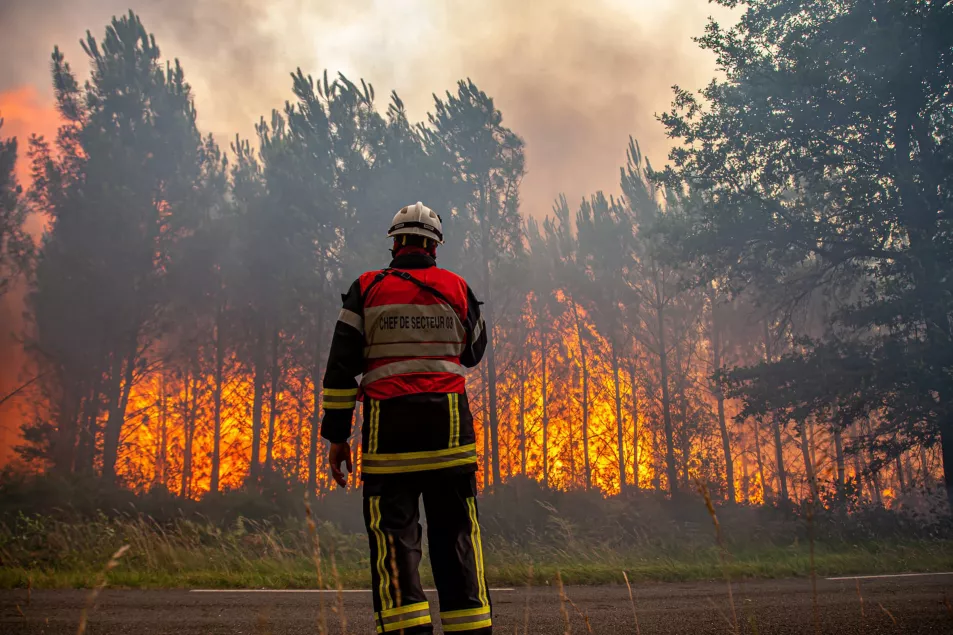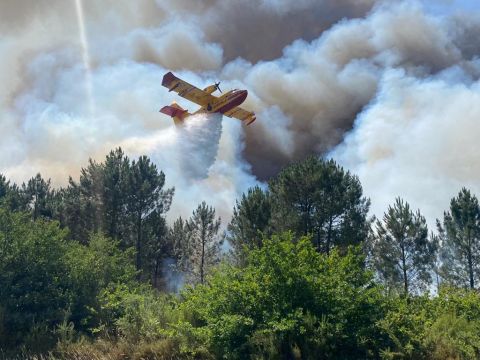Firefighters battled wildfires raging out of control in Spain and France, including one whose flames reached two popular Atlantic beaches on Sunday, as Europe wilted under an unusually extreme heatwave.
There have been no fire-related deaths in France or Spain so far, but authorities in Madrid have blamed soaring temperatures for hundreds of deaths. And two huge blazes, which have consumed pine forests for six days in southwestern France, have forced the evacuation of some 16,200 people.
In dramatic images posted online, a wall of black smoke could be seen rolling towards the Atlantic on a stretch of Bordeaux’s coast that is prized by surfers from around the world. Flames raced across trees abutting a broad sandy beach, as planes flew low to suck up water from the ocean. Elsewhere, smoke blanketed the skyline above a mass of singed trees in images shared by French firefighters.

In Spain, firefighters supported by military brigades tried to stamp out over 30 fires consuming forests spread across the country.
Spain’s National Defence Department said that “the majority” of its firefighting aircraft had been deployed to reach the blazes, many of which were in rugged, hilly terrain that was difficult for ground crews to access.
Drought conditions in the Iberian Peninsula had made it particularly susceptible to wildfires — some caused by lightning, others by accident, and some set intentionally — after a mass of hot air blew up from Africa.
Fire season has hit parts of Europe earlier than usual this year after a dry, hot spring that the European Union has attributed to climate change. Some countries are experiencing extended droughts, while many are sweltering in heatwaves.
In Spain’s second heatwave of the summer, many areas have repeatedly seen peaks of 43C (109F).

According to Spain’s Carlos III Institute, which records temperature-related fatalities daily, 360 deaths were attributed to high temperatures from July 10 to 15. This was compared with 27 temperature-related deaths over the previous six days.
Almost all of Spain was under alert for high temperatures for another day on Sunday, while there were heatwave warnings for about half of France, where scorching temperatures were expected to climb higher on Monday.
The French government has stepped up efforts to protect people in nursing homes, the homeless and other vulnerable populations after an intense heatwave and poor planning led to nearly 15,000 deaths in 2003, especially among the elderly.
Meanwhile, the fire in La Teste-de-Buch, in the Bordeaux area, had forced 10,000 people to flee at a time when many flock to the nearby Atlantic coast area on holiday.
The Gironde regional government said on Sunday afternoon that “the situation remains very unfavourable” due to gusting winds that helped fan more flare-ups overnight.

“The emergency services are prioritising protecting the population, preserving sensitive areas and limiting the progression of the fire,” authorities said.
A second fire near the town of Landiras, south of a valley of Bordeaux vineyards, had forced authorities to evacuate 4,100 people this week.
Authorities said that one flank had been brought under control by the dumping of white sand along a 1.2-mile (2km) stretch. But another flank remained unchecked.
People who were forced to flee shared worries about their abandoned homes with local media, and local officials organised special trips for some to fetch pets they had left behind in the rush to get to safety.
Overall, more than 40 square miles (100 square kilometres) of land have burned in the two fires.
Emergency officials warned that high temperatures and winds on Sunday and Monday would complicate efforts to stop the fires from spreading further.

“We have to stay very prudent and very humble, because the day will be very hot. We have no favourable weather window,” regional fire official Eric Florensan said on radio France-Bleu.
Some of the most concerning blazes in Spain were concentrated in the western regions of Extremadura and Castilla y Leon. Firefighters had been unable to stop the advance of a fire that broke out near the city of Caceres that was threatening the Monfrague National Park and had kept 200 people from returning to their homes.
Another fire in southern Spain near the city of Malaga had forced the evacuation of a further 2,500 people. There were more fires near the central city of Avila, in north-west Galicia, among other areas.
Hungary, Croatia and the Greek island of Crete have also fought wildfires this week, as have Morocco and California.
The scorching temperatures have reached as far north as the UK, where the Met Office weather agency issued its first ever “red warning” of extreme heat for Monday and Tuesday, when temperatures in southern England may reach 40C (104F) for the first time.
That would still be relatively bearable compared with the 47C (117F) recorded in Portugal’s northern town of Pinhao on Wednesday, establishing a new national record.







